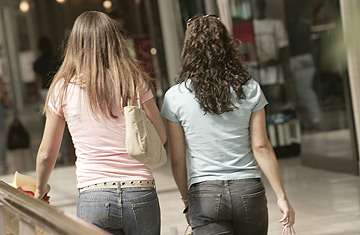
Teenagers with Shopping Bags
Curfew has never been a popular term with teens. But lately the C-word has retailers and even law-enforcement officers looking for synonyms to describe the way many malls like the St. Louis Mills have started ejecting teens at 6 p.m. on Fridays and Saturdays unless they're with a parent or guardian. "I hate to call it a curfew," Carl Wolf, chief of police in Hazelwood, Mo., says of the Mills' seven-month-old policy. "I like to call it a family night."
That's certainly the most wholesome spin for the growing movement among U.S. malls to take back the night from the hordes of rowdy teenagers scaring away older customers. A decade ago, Minnesota's massive Mall of America became one of the first in the industry to rise up against the widespread use of the mall as babysitter, and dozens of shopping centers have followed suit in the past two years. Some 46 of the 1,200 enclosed malls in the U.S. have adopted parental-escort policies, and others are likely to join them soon, according to the International Council of Shopping Centers. Says the trade group's spokesman, Malachy Kavanagh: "Every time I talk to security guys and management, more and more of them are considering doing it."
One of the most heavy-handed policies is the 2 p.m. curfew that kicked in this spring for visitors under 18 at Mayfair Mall in suburban Milwaukee. Access was restricted for unsupervised teens on Fridays and Saturdays after several high-profile scuffles, including one in which an 18-year-old's handgun flew over the second-floor railing. The youth-oriented Campaign Against Violence protested that minors weren't responsible for most of the violence and argued that the new rule would take away one of the few safe places where teens can hang out, but the group ran into opposition when it tried to rally support from the community. Says state co-director Jayme Montgomery: "Some of the elders felt like the children are out of control."
Many mall officials would agree. As more kids flock to shopping centers, walkways get blocked, older customers jostled and strollers overturned amid the horseplay. Even teens blame their peers. "People just hang out there and do dumb stuff, and we have to pay for it," says Jordan Keinert, 17, of Mayfair's new policy. Interim measures such as issuing trespass warnings and beefing up police presence are often not enough to rein in throngs of trash-talking teens. "They'd still be all over the place no matter how many you threw out," says Bob Harrington, head of corporate security for Pyramid Management Group, which oversees 20 malls in New York and Massachusetts. And since too many cops chasing too many kids does not a pleasant shopping setting make, Pyramid now forces unchaperoned minors to leave its six biggest malls by 4 p.m. on Fridays and Saturdays.
It's not a decision any mall owner makes lightly. Teens may shell out a lot less per visit compared with older customers, but nobody wants to alienate tomorrow's big spenders. David Renninger, a client-relationship executive at Jones Lang LaSalle, the largest third-party manager of shopping centers in the U.S., stresses that teens remain sought-after customers even in places with curfews. "We just want them to be supervised by a parent," he says. But while escort policies may restore a mall's family-friendly image--Renninger says some tenants at Genesee Valley Center in Flint, Mich., have reported double-digit sales growth since a 5 p.m. curfew began June 8--they can have a domino effect. Indeed, after Pyramid restricted teen access at one property, Harrington fielded calls from security directors at nearby malls who were only half joking when they said, "Thanks a lot for doing that. They're all over here now." *
